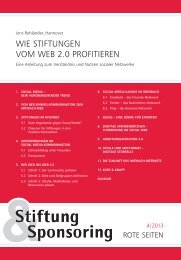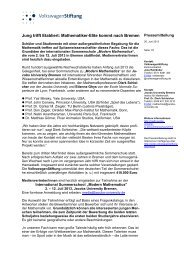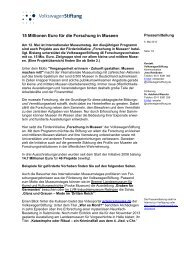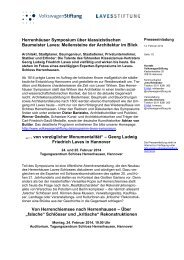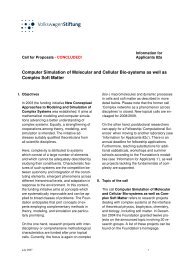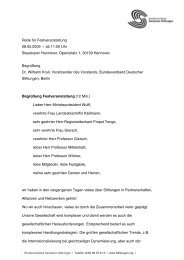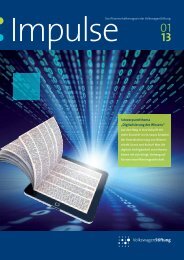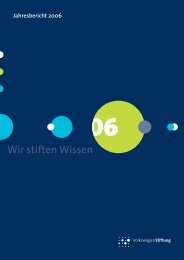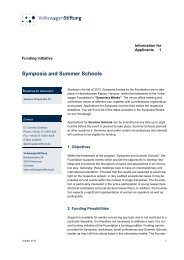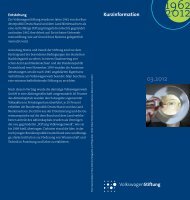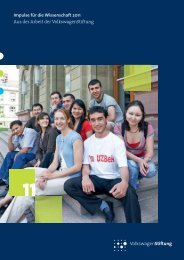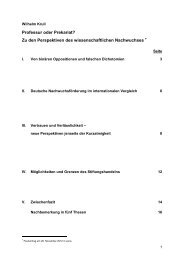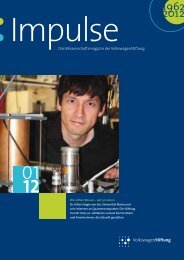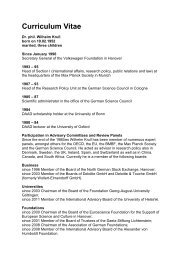Bewilligungen im Jahr 2008 - Volkswagen Stiftung
Bewilligungen im Jahr 2008 - Volkswagen Stiftung
Bewilligungen im Jahr 2008 - Volkswagen Stiftung
Erfolgreiche ePaper selbst erstellen
Machen Sie aus Ihren PDF Publikationen ein blätterbares Flipbook mit unserer einzigartigen Google optimierten e-Paper Software.
Legon<br />
- 75 -<br />
Propagation, cultural practices, genetic and biochemical diversity of two medicinal plant<br />
species, Croton membranaceus and Cryptolepis sanguinolenta<br />
Bewilligung: 09.02.2011 Laufzeit: 3 <strong>Jahr</strong>e<br />
Croton membranaceus and Cryptolepis sanguinolenta are two medicinal plant species<br />
with restricted distribution in the West Africa region that are on the verge of extinction.<br />
Root extracts of Croton membranaceus are used to treat measles and urine retention<br />
problems, while Cryptolepis sanguinolenta have been found to have anti-malarial, ant<strong>im</strong>icrobial<br />
and anti-hyperglycemic properties. The goal of this project is to identify<br />
populations with high bioactive compounds, assess genetic diversity and develop<br />
propagation and cultivation protocols for their domestication. The concentration of<br />
bioactive compounds and percentage composition of the active ingredients in the plants<br />
will also be determined. Anti-malaria activities of C. sanguinolenta bioactive compounds<br />
would be assessed. The effectiveness of C. membranaceus decoctions will be<br />
determined using the MTT assay protocol. It is expected at the end of this research that<br />
natural habitats of C. membranaceus and C. sanguinolenta with high concentration of the<br />
bioactive compounds would be identified. Propagation, cultural and management<br />
practices for the above mentioned species would be developed.<br />
University of Ghana, Accra<br />
Department of Crop Science<br />
Dr. J. Naalamle Amissah<br />
Legon<br />
GHANA<br />
Tel.: + 233 285 331 362<br />
____________<br />
Nairobi<br />
Screening polyextremophiles for biomineralization of organochlorine pesticide<br />
stockpiles in Kenya<br />
Bewilligung: 09.02.2011 Laufzeit: 3 <strong>Jahr</strong>e<br />
Stockpiled obsolete pesticides (mainly organochlorine compounds) are a serious and<br />
growing public health and environmental danger confronting nearly every country in<br />
Africa. This project proposes to develop novel biotechnological alternatives for the safe<br />
and sustainable disposal of recalcitrant obsolete pesticides. A "search, discover and<br />
harness" approach is envisaged where microorganisms that can tolerate multiple<br />
environmental extremes (polyextremophiles) will be screened systematically for new<br />
biological activities and biochemical pathways for the detoxification, degradation or<br />
complete mineralization of environmentally persistent organochlorine pesticides. This<br />
project is expected to catalogue new microbial taxa, discover novel biodegradative routes<br />
for recalcitrant chemical pesticides, and create new biotechnologies for pesticide<br />
stockpile el<strong>im</strong>ination using 'mined' polyextremophile genes. In doing so, the project will<br />
have harnessed natural resources to generate information beyond existing knowledge<br />
and understanding as well as new tools for bioengineering cheap non-polluting<br />
bioprocesses for the rapid mineralization of organochlorine pesticides.<br />
University of Nairobi<br />
College of Biological and Physical Sciences<br />
Laboratory of Biochemistry<br />
Dr. Benson Wamalwa<br />
Postfach 30197<br />
Nairobi 00100 GPO<br />
KENIA<br />
Tel.: + 254 729 903 792<br />
____________



